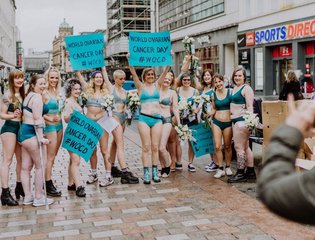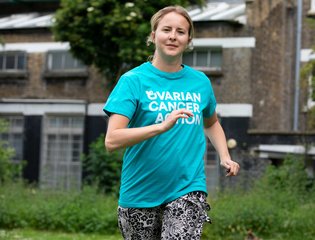Nick: "The hope is for a future where Ovarian Cancer will be a survivable disease."
Nick, alongside his rescued English Setter Louis, is taking on the challenge of a lifetime.
Step by step, they’re going to walk the incredible 3,048 miles of English coastline to raise money in memory of Nick’s late wife, Lisa. After 7 months of walking, Nick hopes to raise enough to sponsor an ovarian cancer researcher in Lisa’s name. If you’d like to contribute to Nick’s efforts then you can do so at his fundraising page.
Here, Nick tells us all about Lisa – their life together, her unwavering positivity in the face of her diagnosis, and ultimately why he’s taking on this amazing challenge in her name.
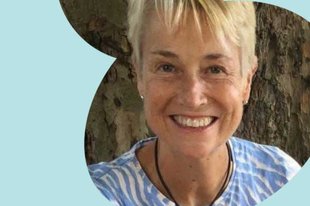
Lisa passed away from ovarian cancer in 2023
"I’d first met Lisa in 1985. She was coming out of a lift and I knew, right from that moment, that she was someone I wanted to know. Lisa has since said her first thought of me was that I seemed a little grumpy! Thankfully, I managed to convince her to give me a chance, and our love story began.
When Lisa was first diagnosed in 2015, we were filled with so many emotions – fear, uncertainty, doubt. She’d gone for check-up only to tell them she was feeling a bit off – what we know now were the symptoms of ovarian cancer - but when the response was a diagnosis, neither of us could believe it.
We were lucky that our GP moved quickly, but so much happened in a short space of time. First, she was scheduled for surgery, but then it was cancelled. She was originally in one hospital, and then quickly moved to another in a different part of the country. We were told it was caught early, but then told it had still spread too far for a full recovery.
Lisa was an incredibly tough cookie mentally and physically. I already knew this about her, but I didn’t truly see it until we were told her life expectancy was now three to five years. From that moment, her mental strength and positivity left me gobsmacked.
I remember one moment where Lisa was worried that because of her treatment I wouldn’t find her attractive anymore. I told her that my love for her transcended that, and actually being witness to her resilience and strength only made me love her more.
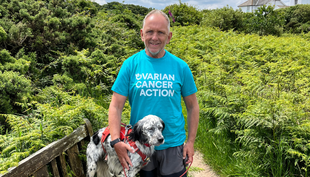
Nick and his dog Louis are walking around the English coast in Lisa's honour.
“By helping Ovarian Cancer Action in some small way, the hope is for a future where Ovarian Cancer will be a survivable disease.”
Lisa allowed her diagnosis to push her into living the best life she could with the time she had left. I quit my job, and we travelled when we could. We went for a long weekend in Rio De Janeiro once, just because – why not? Before she passed, Lisa told me that we’d ticked almost everything off her bucket list. I’m so glad we had that time.
I told Lisa my plans to walk this challenge whilst she was in hospital. She thought I was crazy! To me it was simple – I’m going to walk the English coastline, with my English setter, for my English Rose.
Lisa passed away in 2023, just before our 30th wedding anniversary. She always considered herself one of the lucky ones for having as long as she did – but everyone around her for those last 8 years knows they’re the real lucky ones.
Since being on my walk of the English coastline, the people Louis and I have met have been amazing. It’s been such a great experience to talk to people and share my story, but also a real reminder of the importance of human connection. Seeing the way people have loved Louis has been so heartwarming – including a lovely barmaid who personally cut up some burgers so Louis could have a decent tea after an exhausting day!
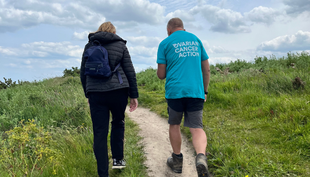
Nick walking with the Ovarian Cancer Action CEO
But it’s also been tough. There’s a lot of time for reflection on these walks, and with that can come a lot of tears. There was one very kind lady who the second I told her about Lisa, she told me about her sister that had passed of ovarian cancer. It was such a meaningful moment. Thankfully there have also been plenty of smiles and laughs, too! And I’ve felt such incredible support from the public.
The reason I’m doing all of this isn’t for me. It's about making ovarian cancer survivable for future generations. We've all got special women in our lives, and we want this to be a thing of the past. And I knew as I told Lisa my plans, that if I could contribute towards that in any way then I'm 100% in to do my bit.
The duo have already met so many supportive people on the way – raising awareness of ovarian cancer as they go.
You can follow their journey on Instagram, join Nick and Louis on a walk to keep him motivated and donate to his mission via his website.
We’re so grateful to Nick and Louis for everything they are doing in Lisa’s memory. This will change the future for women with ovarian cancer.
